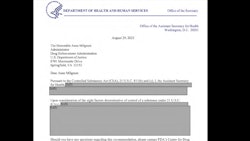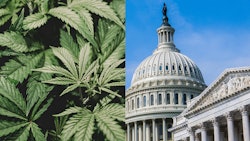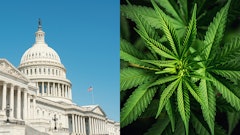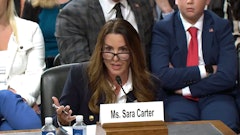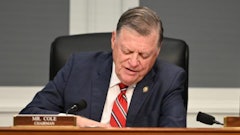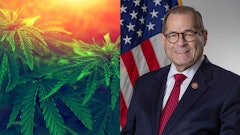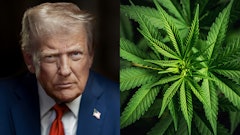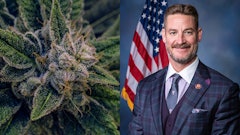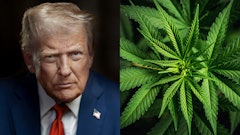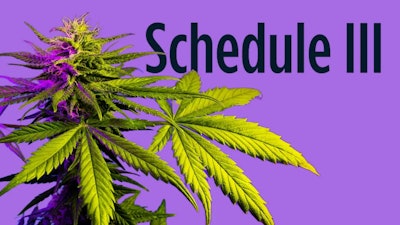
U.S. government officials have released documents detailing why they believe cannabis should be reclassified under federal law, confirming for the first time publicly that, after analyzing the science and data, cannabis has acceptable medical uses and a moderate to low risk of physical dependence.
The U.S. Department of Health and Human Services’ (HHS) released the widely reported and heavily redacted August letter detailing its cannabis rescheduling recommendation, after multiple Freedom of Information Act (FOIA) requests and at least one lawsuit.
HHS, in addition to confirming its Schedule III recommendation, also released an unredacted version of a more than 250 page rescheduling evaluation after multiple requests, a FOIA lawsuit and motion for summary judgment filed by Matthew Zorn, partner at Yetter Coleman.
“Your motion for summary judgment will be moot once the agency makes this release,” the official noted in an email to Zorn on Jan. 11, which he shared in his “On Drugs” newsletter, co-produced with fellow attorney and cannabis advocate Shane Pennington, partner at Porter Wright Morris & Arthur.
On Jan. 12, HHS released documents detailing why, in accordance with the the Food & Drug Administration's (FDA) review, it recommends that cannabis, now considered a Schedule I drug under the Controlled Substances Act (CSA), should be moved to Schedule III.
The review and recommendation resulted from President Joe Biden’s directive in October 2022 to Secretary Xavier Becerra and Attorney General Merrick Garland to initiate an administrative process on cannabis’s CSA scheduling via a medical and scientific analysis of cannabis. The Drug Enforcement Administration (DEA) has the final authority to reschedule cannabis based on the HHS and FDA findings--or not.
Rachel L. Levine, Assistant Secretary for Health, sent the documents to Anne Milgram, Administrator at the DEA, on Aug. 29, outlining the evaluation and findings based on the eight factors the FDA considers when determining where a substance should fall within the CSA, which consists of Schedules I (most harmful, addictive and illegal) to V.
Prepared by the FDA's Controlled Substance Staff, the documents detail why cannabis should no longer be considered a Schedule I drug.
HHS, in its examination of whether there is a current acceptable medical use (CAMU) for cannabis, found "more than 30,000 [health care professionals] are authorized to recommend the use of marijuana for more than six million registered patients, constituting widespread clinical experience associated with various medical conditions recognized by a substantial number of jurisdictions across the United States," according to the HHS documents.
The review also noted that "there is some credible scientific support for the use of marijuana in the treatment of pain, anorexia related to a medical condition, and nausea and vomiting, with varying degrees of support and consistency of findings."
However, the conclusions would not be enough to "support FDA approval of a marijuana drug product for a particular indication," and officials noted limitations in clinical research supporting the efficacy of cannabis to treat specific ailments other than the few listed.
In addition to recognizing cannabis's medical benefits, officials cite evidence as to why they believe cannabis does not pose a significant risk to public health, and compared it to other drugs listed on the CSA, including heroin (Schedule I), fentanyl (Schedule II), oxycodone (Schedule II), hydrocodone (Schedule II), cocaine (Schedule II), ketamine (Schedule III), and benzodiazepines (Schedule IV).
"The risks to the public health posed by marijuana are lower compared to other drugs of abuse (e.g., heroin, oxycodone, cocaine), based on an evaluation of various epidemiological databases for emergency department (ED) visits, hospitalizations, unintentional exposures, and most importantly, for overdose deaths," the FDA notes. "The rank order of the comparators in terms of greatest adverse consequences typically places heroin, benzodiazepines and/or cocaine in the first or immediately subsequent positions, with marijuana in a lower place in the ranking ....
"After assessing all available preclinical, clinical, and epidemiological data, FDA recommends that marijuana be rescheduled from Schedule I into Schedule III of the CSA. Schedule III drugs are classified as having a potential for abuse less than the drugs or other substances in schedules I and II, a currently accepted medical use in treatment in the United States, and moderate or low physical dependence or high psychological dependence that may result from their use. NIDA [National Institute on Drug Abuse] concurs with this recommendation."
The eight factors FDA used to make this conclusion are:
8. Whether the substance is an immediate precursor of a substance already controlled.
HHS had confirmed in an email Aug. 30 to CBT that it “expeditiously responded to President Biden’s directive to HHS Secretary Becerra and provided its scheduling recommendation for marijuana to the DEA on August 29, 2023.”
But after email correspondence between CBT, HHS and DEA, as well as FOIA requests to both the HHS and DEA from CBT and others, neither agency confirmed if HHS recommended reclassifying cannabis from a Schedule I to a Schedule III substance in the CSA, as Bloomberg first reported after seeing but not obtaining the letter. No other media outlets had reported seeing nor obtaining a copy of the HHS letter, nor its enclosures, to the DEA.
The HHS rescheduling documents, which Zorn posted on X, formerly known as Twitter, note that the risk of potential harms from cannabis consumption is far lower than drugs within the same, and even lower, scheduling classes.
The DEA reiterated its authority over rescheduling decisions in a December letter to U.S. Rep. Earl Blumenauer, D-Ore., as previously reported by CBT.
“Even though this has long been anticipated, it is still a very welcome development," Blumenauer said in an email statement Jan. 12 in response to HHS releasing its rescheduling recommendation. "It is another step toward the inevitable legalization of cannabis and ending this sad chapter of the failed war on drugs.”
The HHS documents provide historical context for past rescheduling considerations, noting that there have been four other petitions for rescheduling since 2000. The most recent study of cannabis’s Schedule I status ended with a DEA rejection in 2016.
Zorn filed the lawsuit to obtain the HHS letter Sept. 29 in the U.S. District Court in the District of Columbia.
“I just want the document to be posted,” Zorn told CBT in November, after filing a motion for summary judgment. “That’s it. I do not care about making any broader point of law. I just want the document.”
Since the August announcement that HHS had sent its scheduling recommendation to the DEA, multiple officials have called on the agency to move cannabis to Schedule III, and quickly.
U.S. Senator [Kirsten] Gillibrand D-N.Y. and a group of 31 House members are among lawmakers that have written letters calling on the DEA to reschedule cannabis. Most recently, U.S. Rep. Steve Cohen, D-Tenn., wrote a letter Jan. 4 to DEA Administrator Milgram urging her “in the strongest possible way” to act expeditiously on the HHS recommendation, as noted in previous CBT reporting.
However, according to Pennington, “Where we are in the process is still very early,” he told CBT earlier this month. “DEA has HHS’ recommendation, which is an important step, but it’s very preliminary because now we’re going to get, eventually, a proposed rule from DEA, then we’ll get notice and comment for 60 days, [a] public participation period. And at the same time, DEA will allow interested parties to request hearings on the record.”
Then, once the DEA writes the final rule, there is supposed to be another waiting period before implementation, according to Pennington.
“There are some exceptions to that, but the DEA generally requires a 30-day delay between the time it’s published and the time it becomes effective,” he said “And so, for those who are really wanting to know, can this get done by the election, which I think is a question that many people are asking, my view is because of everything I just said, probably not. Because no matter how much the president or Anne Milgram wanted to get done that fast, those processes take time.”









